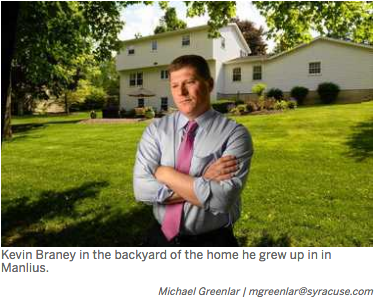http://www.syracuse.com/crime/index.ssf/2015/05/syracuse_bishop_still_mulling_whether_to_outing_priests_with_credible_abuse_alle.html
SYRACUSE, N.Y. -- The Catholic bishop of Syracuse has decided not to publicize the names of the 11 priests in his diocese against whom there's credible evidence they molested children. Bishop Robert Cunningham will stick with the diocese's practice of withholding the names from the public, said Danielle Cummings, a spokeswoman for the diocese. The diocese will continue to publicly confirm one of the priests' names if a victim discloses it first, she said. Cunningham told Syracuse.com in December that he was considering making the names of the priests public, as at least 27 dioceses across the country do. Cunningham also told one victim, Kevin Braney, last June that he would consider making the change. Cunningham has heard from some "individuals who have been harmed" who asked that the priest's name "never be made public for their own reasons," Cummings told Syracuse.com in an email. "Some have written asking him to continue with the current practice and others who have asked him to change his practice," Cummings said. ""He is keeping with the current practice. At present, he has not found a way to honor both requests/expectations." Braney accused Monsignor Charles Eckermann in 2013 of raping him repeatedly when Braney was an altar boy at St. Ann's Church in Manlius in the 1980s. The diocese found Braney's accusations credible last year and defrocked Eckermann.
All of the 11 priests have had the same restrictions placed on them as Eckermann did: They're not allowed to function as a priest, wear clerical garb or present themselves as priests, Cummings said. Braney said he was disappointed with Cunningham's decision and found it disingenuous to claim victims didn't want their attackers' names released. Releasing the priest's name would not mean any of his victims would also be identified publicly, Braney said. "It feels like they're using victims to protect their own interests," said Braney, who lives in Colorado. "They're using a cloud of secrecy and shame to their own advantage. They're protecting pedophiles." Charles Bailey, another survivor of a priest's sexual abuse as a child, called Cunningham's decision "disgusting." The accused priests "don't stop being predators" just because the diocese finds credible evidence against them, Bailey said. Even though none of the 11 priests is supposed to be doing any priestly duties, some of them have been, he said. Bailey, who wrote a book about his abuse, said he's gotten phone calls from people who've seen one of the accused priests performing religious ceremonies. If the priests' names were public, they'd be less likely to victimize anyone else, Bailey said. "You don't just eat one potato chip," he said. "These priests don't just abuse one child." Not releasing the names of offenders isn't protecting victims, he said. "No one's suggesting the victims' names would be public," said Bailey, who's the head of the local chapter of Survivors Network of those Abused by Priests. Cummings and another diocesan official met last week with about 70 parishioners from Immaculate Conception and St. Ann's churches, she said. The question of whether Cunningham would publicize the priests' names came up. Some of the parishioners expressed concern that not identifying the offending priests unfairly cast a shadow over all priests, said Braney, who attended the meeting. "Releasing the names would dispel the negative cloud that's hanging over everybody," Braney said. Rochester is one of 27 dioceses that does publish the names. Most of the 194 dioceses in the U.S. do not, according to the U.S. Conference of Catholic Bishops. Contact John O'Brien anytime | email | Twitter | 315-470-2187
|
.
Any original material on these pages is copyright © BishopAccountability.org 2004. Reproduce freely with attribution.

